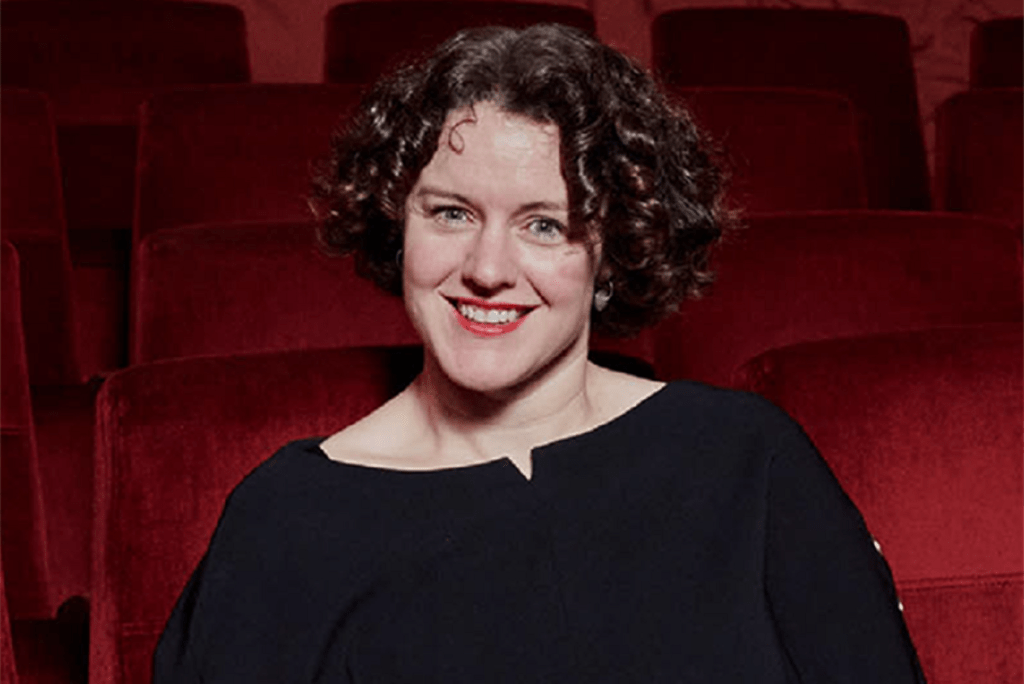Adele Schonhardt features on AGSM’s new ‘Business Of Leadership’ podcast, where guests from business, government, for-purpose and academia share their stories about leadership in today’s accelerated world. Each episode examines leadership in times of complexity and how we can see the world differently, rather than be transfixed by change. (Partner Content)
Adele Schonhardt believes the best leaders are the ones who recognise they hold responsibility for something broader than their organisation, or direct sphere of influence.
It’s this belief in looking to the bigger picture that backdrops the social enterprise Melbourne Digital Concert Hall, of which Adele is the Co-Director. It’s Australia’s first completely virtual concert venue, where musicians and audiences have been able to connect for performances online during the pandemic.
It’s a novel idea that works both ways. Audiences get to enjoy musical performances amid COVID-19 restrictions, and musicians get paid for it.
Along with her Co-Director, Chris Howlett, Adele was devastated when COVID-19 hit Australia. She saw many of her colleagues across the performing arts industry lose all their current and upcoming work in an instant.
“Suddenly, we saw highly skilled and competent colleagues of ours, who had had a whole year of work lined up, with nothing left. It’s absolutely devastating,” she told Women’s Agenda.
Adele and Chris got on the phone shortly after the pandemic started, and said, “Look, we can’t just sit here and let this happen. We’ve got to do something.”
With a wealth of experience and contacts in the performing arts sector, the pair decided to put their minds together and lead a solution for the musicians who had been so badly impacted by the new restrictions.
“Why don’t we have a go at taking some of these concerts, that in some cases had already been planned, and put them up online, streaming them live and charging a ticket fee for them,” Adele explains.
“And then we would pass on that ticket fee to the musicians.”
And so, the Melbourne Digital Concert Hall was born. It was an entirely new formula that immediately tapped into a ready and waiting audience, who were unable to leave their homes.
With the help of some generous partners including Athenaeum Theatre, Kawai pianos and 5stream, the platform was viable from the start.
Speaking to Women’s Agenda, Adele explains that many months have now passed since Melbourne Digital Concert Hall began, and it’s become much bigger than they had ever anticipated.
“We called it Melbourne Digital Concert Hall, because originally, we wanted to support Melbourne musicians. We thought, if we were lucky we may raise $20,000 or $30,000 for these local musicians,” she says.
“We’re at a point now where we have hosted 150 concerts, we’ve generated $650,000 in income for musicians and we’re not only streaming from Melbourne, we’re in Sydney, Brisbane, Perth, Adelaide. We’re about to start in Hobart. We’ve been in London, Berlin and Singapore.”
From the outset, Adele has been unwavering in her commitment to help musicians around Australia get through the pandemic, and the almost immediate decimation of the performing arts sector. She saw great urgency in doing something collective, and beyond her normal reach, in order to support them.
“I’ve actually stepped away from my full-time job in order to do this, because I think the need is far greater among our musician community. I don’t think any organisation that by necessity is focused in on itself, trying to survive for its own sake, is going to be able to see the bigger picture,” she says.
Inadvertently, the Melbourne Digital Concert Hall has tapped into a need that perhaps nobody realised was there, especially on such a large scale. From audience surveys, the social enterprise has found that at least a quarter of their audience are people who don’t typically get to go to a regular venue.
“That might be because they are in a regional location, or because they have health issues, or are a bit older and don’t like going out at night anymore. Or because they have caring responsibilities, or small children,” Adele says.
The online streaming of classical performances has been a beacon of light for many of these people. There have been some incredibly moving messages from people all over, explaining what this accessibility of music has meant to them.
Looking to the future, Adele sees the Melbourne Digital Concert Hall as a major player in the recovery phase of the performing arts sector, as we’re coming out of COVID-19.
“Many of the musicians are earning more than they would performing at traditional venues,” she says. “In a way it’s a disrupter as well, with many of them are saying they will come and perform with us again next year.”
“I think there will be a few more organisations like ours emerging to support the sector. It’s going to be incredibly necessary to keep the music going at all.”
As a leader, Adele isn’t looking to the past, back to the status quo. For her, it’s all about looking at the broken pieces that remain available, and putting them together in new ways.
“It’ll help to get through this moment, as well as seize the opportunities that only exist during this time.”


